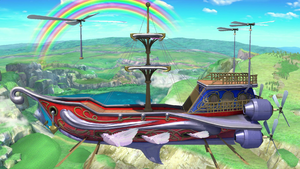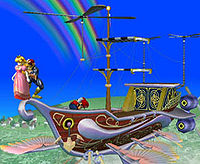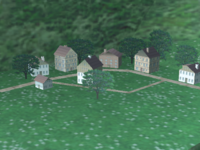Rainbow Cruise
| Mushroom Kingdom: Rainbow Cruise | |
|---|---|
 Rainbow Cruise in Super Smash Bros. Ultimate. 
| |
| Universe | Mario |
| Appears in | Melee Brawl Ultimate |
| Availability | Starter |
| Crate type | Presents (Brawl only) |
| Maximum players | 4 (Melee and Brawl) 8 (Ultimate) |
| Tracks available | In Melee: Rainbow Cruise In Brawl: Rainbow Cruise (Melee) Princess Peach's Castle (Melee) Bolded track must be unlocked |
| Article on Super Mario Wiki | Rainbow Ride |
Rainbow Cruise (レインボークルーズ, Rainbow Cruise), also known as Rainbow Ride, is a stage that appears in Super Smash Bros. Melee, Super Smash Bros. Brawl, and Super Smash Bros. Ultimate. It is based off the "Rainbow Ride" stage from Super Mario 64. It is also one of Mario's home stages, and it is his stage in All-Star Mode, along with any of his teammates, as well as Bowser's stage in All-Star Match 1 of Melee's Event Match.
Stage overview
The battle starts off on a flying ship that is facing left. The ship has seven propellers and six giant paddles, which make it fly. The anchor hangs off the bow. The ship is flat in the center, but not on the sides. The bow of the ship is just a bit higher than the deck. The stern is clearly higher than the rest of the ship, including the bow. It is wide enough to fit two characters. The stern increases the height of the back of the boat, which can help characters who can wall-grapple. In the middle of the boat is the mast of the ship. It has two levels to fight on. The space between the middle platform and the deck is slightly larger in comparison to the space between the top platform and the middle. The top platform is also shorter than the middle one. It is just large enough to fit Bowser. After about thirty seconds, the ship will crash into the next segment of the stage and sink. When the ship sinks, the characters will have to battle on the strange floating platforms that follow. The platforms are different and feature a rotating axle platform, flying carpets, and falling blocks. The stage moves in a clockwise order and at the end, downward-pointing arrows that flash red will appear. They indicate that all players should descend to the lower parts of the stage before the camera zooms down. Those who do not make it to the boat, which is waiting below, will be KO'd off the top off the screen. The cycle continues from there.
Name confusion
While the Western localization version of the Super Mario 64 stage's name is "Rainbow Ride," the original Japanese version's is "Rainbow Cruise." The appearance of the Japanese name in the initial North American release of Melee seemed to be an oversight by the localization team and the stage appeared as "Rainbow Ride" in the PAL release. It also appeared listed as "Rainbow Ride" in North American demos of Brawl, seeming to establish it as the "correct" Western name. Oddly enough, the stage's name in the retail release of Brawl in North America appears as "Rainbow Cruise". In the retail release of the PAL version however, the name appears as Rainbow Ride. CrappyCaptureDevice has also revealed in one of his "History Behind Super Smash Bros." videos that, through a GameShark, if one chooses a stage that they wish to start on (the stages won't have their actual names; instead, they will have either Japanese or roughly translated names, if not names that simply refer to the type/theme of the stages), Rainbow Ride will be shown as Rainbow Cruise.
Origin
This stage is loosely based on Super Mario 64's 15th level, Rainbow Ride, and contains various elements from the level that include the giant flying boat with wings, which has been scaled down and redesigned in this stage; flying carpets that transport Mario to different parts of the level; a seesaw-like platform, which has also been scaled down and redesigned; a giant pendulum-like swing platform, which is redesigned in this stage; and Donut Blocks, which are platforms, first appearing in Super Mario Bros. 3, that fall if Mario stands on them for too long.
Notably, Rainbow Ride is set far above the clouds in Super Mario 64; however, on this stage it is much closer to the ground.
Tournament legality
Rainbow Cruise was allowed in the past during the early stages of the Melee and Brawl metagames; although it was a scrolling stage, it had a predictable pattern and was thus allowed by many tournament organizers. However, it has now been almost universally banned in notable tournaments in both games. This is because the stage has ungrabbable ledges, disappearing platforms, and winding, non-linear passages throughout the entire cruise. This creates massive problems for characters with either poor to mediocre recoveries or slow and sluggish aerial maneuvering. The stage greatly favors characters with good air mobility and jumping ability, allowing some already top-tier characters to almost guarantee a win on this stage (such as Jigglypuff in Melee and Meta Knight in Brawl), and overcentralizes keeping up with the stage instead of actually fighting with the opponent. The abundance of alternative pathways through the stage can also promote stalling by allowing faster characters to avoid fighting altogether.
This stage was also unbanned as a one-off in Apex 2015 for the Salty Suite match between Ken vs. PC Chris. However, neither player counterpicked to this stage during that set.
Gallery
Super Smash Bros. Melee
Super Smash Bros. Brawl
Super Smash Bros. Ultimate
Three Isabelles using their up special on the stage in Ultimate.
Trivia
- During the first part of the boat ride, it is possible to jump out of sight, onto a platform above the boat, avoiding the fights below. The only drawback is taking damage being outside the screen.
- It is possible to hack the camera and see a village settled on the other side of the mountains.
- It is impossible to fall through the magic carpets. The carpets also only rise diagonally upward to the right.
- In Melee, donut blocks were semi-soft platforms, meaning that they could be jumped through, but not dropped through. In Brawl, the donut blocks were changed to hard platforms, meaning characters can no longer pass through them in any way.
- In Melee, Kirby can up throw at the start on the ship and suicide KO off the top due to hitting higher parts of the level which appear later.
- If Pokémon Trainer is used on this stage in Brawl, he will stand on a special magic carpet in the background that is otherwise not present.
- If one stands at the edge of the teeter totter, (near top of screen) one will not slide off when it tilts. Instead, the character will shake repeatedly until he or she jumps off or when it disappears. Video can be seen here.
- Warp Stars never appear on this stage. If the Warp Star is the only item turned on via Item Switch, all the crates and capsules that appear will be explosive or empty.
- This is the only starter Melee stage in Brawl to not return in SSB4.
| Stages in Super Smash Bros. Melee | |
|---|---|
| Starter stages | Brinstar · Corneria · Fountain of Dreams · Great Bay · Green Greens · Icicle Mountain · Jungle Japes · Kongo Jungle · Mushroom Kingdom · Mute City · Onett · Pokémon Stadium · Princess Peach's Castle · Rainbow Cruise · Temple · Venom · Yoshi's Island · Yoshi's Story |
| Unlockable stages | Battlefield · Big Blue · Brinstar Depths · Final Destination · Flat Zone · Fourside · Mushroom Kingdom II · Poké Floats |
| Dream Land · Kongo Jungle · Yoshi's Island | |







